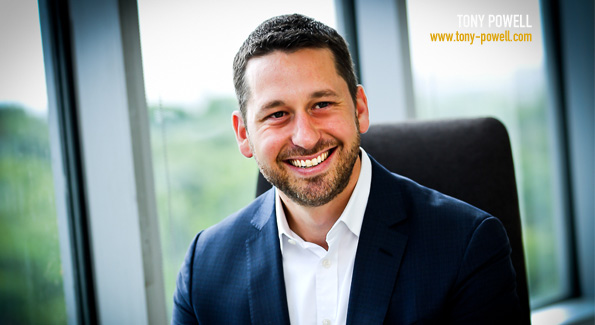Politico’s national politics reporter Eli Stokols on the challenges of the Trump beat

Eli Stokols (Photo by Tony Powell)
When Eli Stokols, 36, relocated to Washington from Denver last year to cover the 2016 Republican presidential campaign for Politico, he thought he’d be following Jeb Bush. But to his shock (and that of other political pundits), he soon found himself immersed in one of the most unexpected campaigns in recent history, that of brazen businessman Donald Trump. The Southern-California-born, Berkeley-educated former broadcast journalist reflects on his whirlwind beat.
Washington Life: Did you ever think that you’d be covering a presidential campaign involving Donald Trump?
Eli Stokols: Um, no. I mean who would think that? [Laughs]. In Colorado, I covered the [2012] presidential race from a swing state perspective and had that vantage point. But, this is totally different. We’ve had to constantly be open to things that we never really thought were possible. When Trump announced and everyone in the newsroom would see him on TV, they would walk by and say, ‘Is that guy still talking?’ No one really took it seriously. This whole year has been a recalibration of all the things we thought we knew. It takes a little while to get your head around the fact that this is a real phenomenon. It’s not just a short-lived media fascination.
WL: So, why do you think he connects to the electorate?
ES: People are just disgusted with politics in general. His skill set and his understanding of media have enabled him to really maximize the exposure and to drown out a lot of other people. But it’s the message that has connected with a core base of supporters, and it’s not just the Republican base. There are Democrats who aren’t enamored with either candidate and who look at Trump and say, ‘You know, I don’t really have a problem with him because he’s not a typical Washington establishment conservative.’ It’s counterintuitive that a billionaire from Manhattan would be the blue-collared champion of people in Iowa and Pennsylvania. But he has been convincing, at least, in presenting himself as somebody who’s willing to take a sledgehammer to the old order in Washington. A lot of people may not like him insulting everybody, may find his comments offensive, but some find it not just entertaining but refreshing that he doesn’t care about political correctness.
WL: What do you think it will take for him to win?
ES: It’s hard to say. Hillary Clinton is so unpopular also. Both of them are trying to make their campaign a referendum on the other person. And if he’s able to do that better than she is, by making a case against her judgment, by citing some more recent controversies, by making a credible case that she’s a threat to our national security, clearly some people would be receptive to it. It may be a heavy lift, but she’s been around for a long time and does not enjoy sky-high approval numbers as it is.
WL: It must be an incredibly exciting campaign to cover. What are some of the challenges?
ES: There is never a dull moment. And it’s different because when the guy is on TV all the time, tweeting all the time, it’s a different campaign to cover. When I got here 14 months ago, everyone thought Jeb Bush would be the nominee. He had this huge network of donors and all these people you could talk to who the campaign was always reaching out to because they needed their financial support. With the Trump campaign, there are about four people who interact with Trump regularly. The campaign happens based on Donald Trump dictating a tweet and hitting send. It’s harder to mine the details from inside and to find things that break through when everybody is writing ‘Oh my God! Donald Trump did this today.’ There’s so much coverage that sometimes you have to do deeper reporting for anything to stick.
WL: What are you expecting at the conventions?
ES: I think it will be totally different from the other conventions that I’ve covered, more of a show. There’s no doubt that it will be far more important to pay attention to the little details. In Tampa you didn’t really worry too much about some of the rules and the platform fights because at the end of the day you knew who was going to be the nominee. And you knew that people around the country weren’t really paying attention to any of that stuff. After this process, and especially if Trump continues to struggle to satisfy conservative Republicans that he can unite the party and carry a consistent message against Clinton, there are going to be efforts to undermine him. So, it will be incumbent upon everybody there who’s covering it to not just watch the spectacle on stage, but to follow all the things happening behind the scenes.
This interview appeared in the Summer 2016 issue of Washington Life.
